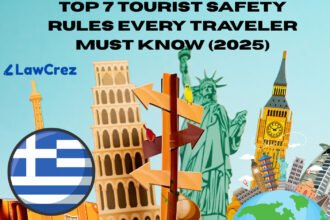Introduction
Every year, millions of people travel across borders in search of culture, adventure, and unforgettable experiences. However, a dream vacation can quickly turn into a legal nightmare if you are unaware of basic tourist safety rules. With rising scams, stricter cultural regulations, cyber-risks, and evolving global laws, it has become more important than ever for travelers—especially students and first-time explorers—to stay informed. Knowing the rules of a country is not just smart, it’s a legal necessity and a critical life skill.
This guide covers the Top 7 Tourist Safety Rules every traveler must know in 2025, along with real legal examples, practical precautions, and insights useful for law students, young lawyers, and travel enthusiasts.
1. Research Local Laws Before Arrival
Before you set foot in a new country, study its local laws and public behavior rules. What is normal in your country might be a punishable offense elsewhere.
Examples:
- Singapore: Chewing gum import/sale is banned.
- Dubai (UAE): Public displays of affection (PDA) are restricted.
- Thailand: Stepping on currency is illegal because it bears the King’s image.
Why this rule matters:
Every nation has its own legal and cultural sensitivities. Violating them—even unknowingly—can lead to fines, detention, deportation, or even imprisonment.
Traveler Tip: Check official government advisories and local tourism websites before traveling.
Also Read: Greece’s High Heels Ban: 7 Shocking Reasons Behind It
2. Protect Your Documents — Passport, Visa & ID
Your passport is the most valuable document you carry abroad. Losing it or mishandling it can trap you in weeks of legal procedures.
Safety Tips:
- Carry physical and digital copies
- Keep original documents in hotel safes
- Avoid handing your passport to strangers (including rental agents)
- Save your embassy or consulate contact
Legal Insight:
Without proper identification, authorities may detain or question you under immigration and local law requirements.
3. Avoid Scams and Tourist Traps
From overpriced taxis to fake guides and “friendship scams,” tourists are common targets.
Common Scams Worldwide:
- Taxi drivers refusing meters
- Fake police asking for “on-spot fines”
- Street vendors forcing purchases
- Currency exchange fraud
Traveler Tip:
Use verified apps like Uber, official government taxis, or hotel-arranged transport. Always demand receipts.
Legal Angle:
Paying unauthorized “fines” encourages illegal behavior. Only deal with uniformed officers and ask for ID.
4. Follow Cultural & Public Behavior Norms
Many countries have strict rules on clothing, gestures, speech, and public behavior.
Examples:
- Japan: No loud conversations on public transport
- Italy (Venice): No sitting or eating at certain heritage sites
- Maldives: Public practice of non-Islamic religion banned
- Australia: Offensive language in public may invite fines
Traveler Tip:
Observe locals. When in doubt, stay modest, polite, and respectful.
Legal Insight:
Cultural norms are often backed by municipal ordinances or national laws—violations can lead to punishments.
Also Read: International Law Summit 2026 Legal Opportunity at Government Law College, Mumbai
5. Stay Cyber-Safe — Public Wi-Fi Can Be Dangerous
Tourists often rely on free Wi-Fi in cafes, airports, and hotels. Cybercriminals know this too.
Rules to Follow:
- Avoid banking or confidential logins on public Wi-Fi
- Use a VPN or hotspot instead
- Never share personal documents through open networks
Legal Angle:
Data theft can lead to identity misuse, financial loss, or international cybercrime complications.
6. Know Emergency Contacts — Police, Ambulance, Embassy
A smart traveler always knows how to get immediate help.
Save these basics:
- Local emergency number (e.g., 112 in EU, 911 in US)
- Your country’s embassy/consulate number
- Hotel address, ID, and local friend/guide number
Why it matters:
In emergencies—medical, criminal, or legal—you cannot depend only on internet searches. Quick response saves lives.
7. Choose Safe Transport & Accommodation
Safety begins with where you sleep and how you travel.
Checklist:
- Book verified hotels/hostels with reviews
- Avoid unregistered taxis
- Share live location with trusted contacts
- Avoid isolated routes late at night
Legal Insight:
Licensed operators are bound by local law, safety checks, and ID requirements. Illegal operators are not.
Also Read: Labour & Industrial Law Notes
Why These Tourist Safety Rules Matter — Legal Perspective
For law students, these rules demonstrate key concepts:
- Due Diligence in Foreign Jurisdictions
- Respect for Cultural and Religious Laws
- Value of Legal Awareness in Public Spaces
- State Duty to Maintain Order and Heritage
Understanding these areas strengthens legal reasoning and nurtures global legal awareness.
Conclusion
Traveling is one of life’s greatest teachers—if done wisely. By following these tourist safety rules, you don’t just avoid fines, scams, or legal trouble—you show respect, cultural maturity, and global citizenship. A smart traveler stays informed, stays alert, and stays safe.
As a law student or travel lover, remember: Freedom to travel comes with responsibility to follow local laws. Your safety is always in your hands—plan smart, act responsibly, and travel without fear.
Also Read: BCCI Supports Criminalization of Match-Fixing; Seeks Intervention in Supreme Court Case







